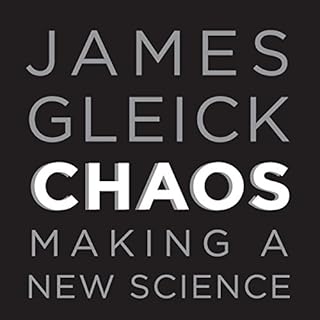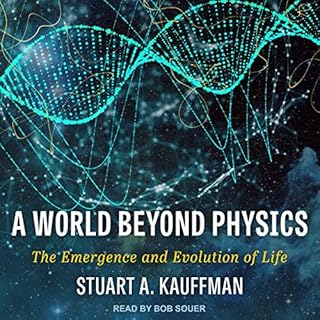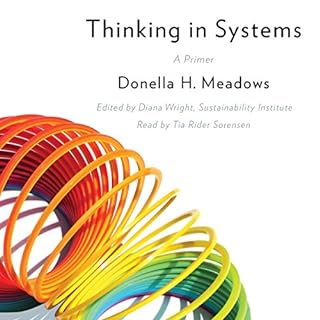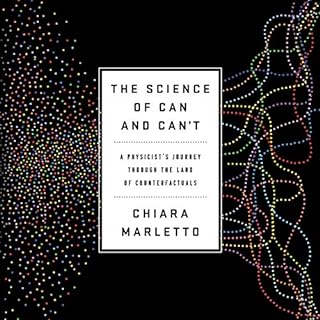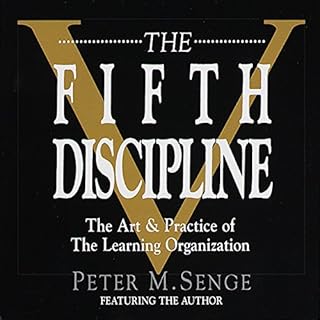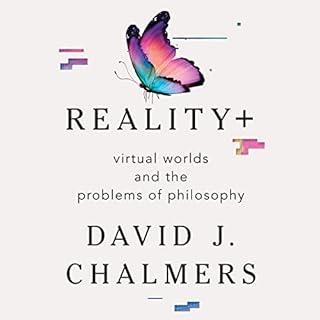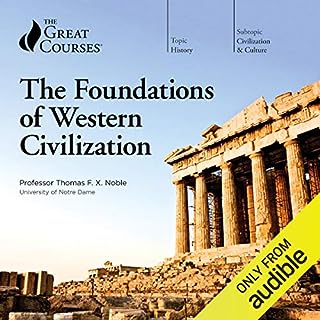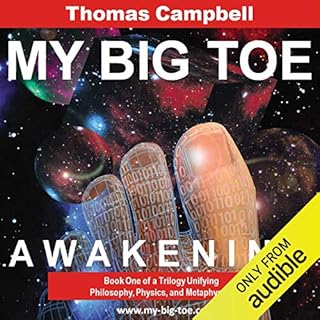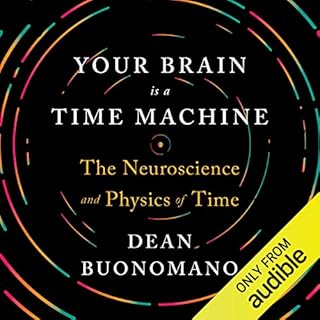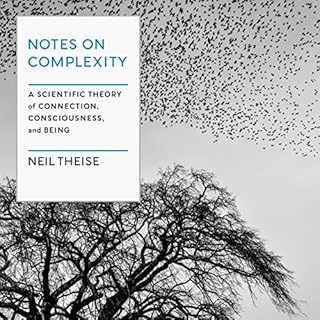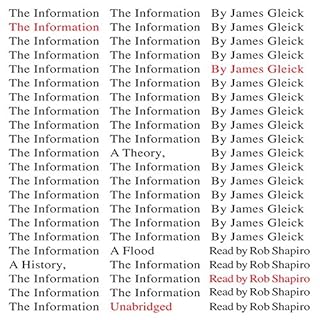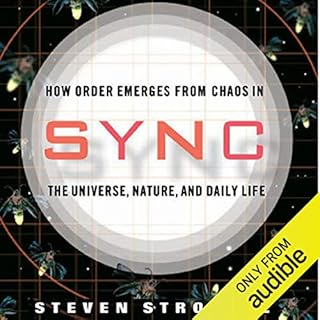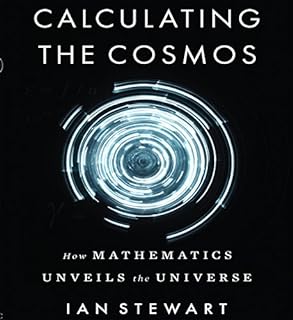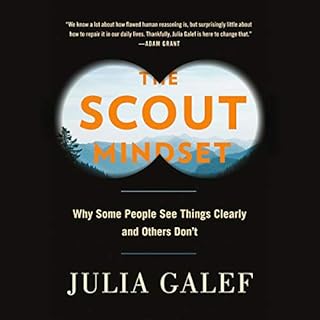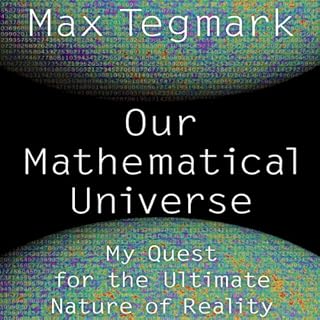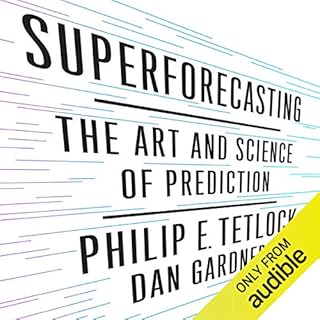
Complexity
A Guided Tour
Failed to add items
Add to Cart failed.
Add to Wish List failed.
Remove from wishlist failed.
Adding to library failed
Follow podcast failed
Unfollow podcast failed
 Prime members: New to Audible?
Prime members: New to Audible?Get 2 free audiobooks during trial.
Buy for $25.00
No default payment method selected.
We are sorry. We are not allowed to sell this product with the selected payment method
-
Narrated by:
-
Kathleen Godwin
-
By:
-
Melanie Mitchell
About this listen
What enables individually simple insects like ants to act with such precision and purpose as a group? How do trillions of neurons produce something as extraordinarily complex as consciousness? In this remarkably clear and companionable audiobook, leading complex systems scientist Melanie Mitchell provides an intimate tour of the sciences of complexity, a broad set of efforts that seek to explain how large-scale complex, organized, and adaptive behavior can emerge from simple interactions among myriad individuals. Based on her work at the Santa Fe Institute and drawing on its interdisciplinary strategies, Mitchell brings clarity to the workings of complexity across a broad range of biological, technological, and social phenomena, seeking out the general principles or laws that apply to all of them.
Skillfully narrated, Complexity: A Guided Tour - winner of the 2010 Phi Beta Kappa Book Award in Science - offers a wide-ranging overview of the ideas underlying complex systems science, the current research at the forefront of this field, and the prospects for its contribution to solving some of the most important scientific questions of our time.
©2011 Melanie Mitchell. Produced and published by Echo Point Books & Media, an independent bookseller in Brattleboro, Vermont.
PLEASE NOTE: When you purchase this title, the accompanying PDF will be available in your Audible Library along with the audio.
©2022 Melanie Mitchell (P)2024 Echo Point Books & Media, LLCListeners also enjoyed...
-
Artificial Intelligence
- A Guide for Thinking Humans
- By: Melanie Mitchell
- Narrated by: Abby Craden, Melanie Mitchell, Tony Wolf
- Length: 9 hrs and 33 mins
- Unabridged
-
Overall4.5 out of 5 stars 400
-
Performance4.5 out of 5 stars 339
-
Story4.5 out of 5 stars 337
In Artificial Intelligence, Mitchell turns to the most urgent questions concerning AI today: How intelligent - really - are the best AI programs? How do they work? What can they actually do, and when do they fail? How humanlike do we expect them to become, and how soon do we need to worry about them surpassing us? Along the way, she introduces the dominant methods of modern AI and machine learning, describing cutting-edge AI programs, their human inventors, and the historical lines of thought that led to recent achievements.
-
5 out of 5 stars
-
Start understanding AI right here!
- By Chad M. on 01-26-20
By: Melanie Mitchell
-
Complexity
- The Emerging Science at the Edge of Order and Chaos
- By: M. Mitchell Waldrop
- Narrated by: Mikael Naramore
- Length: 17 hrs and 8 mins
- Unabridged
-
Overall4.5 out of 5 stars 306
-
Performance4.5 out of 5 stars 264
-
Story4.5 out of 5 stars 263
In a rarified world of scientific research, a revolution has been brewing. Its activists are not anarchists, but rather Nobel Laureates in physics and economics and pony-tailed graduates, mathematicians, and computer scientists from all over the world. They have formed an iconoclastic think-tank and their radical idea is to create a new science: complexity. They want to know how a primordial soup of simple molecules managed to turn itself into the first living cell--and what the origin of life some four billion years ago can tell us about the process of technological innovation today.
-
1 out of 5 stars
-
You won't learn anything you didn't know
- By Dennis E. Alwine on 12-26-20
-
Why Machines Learn
- The Elegant Math Behind Modern AI
- By: Anil Ananthaswamy
- Narrated by: Rene Ruiz
- Length: 13 hrs and 30 mins
- Unabridged
-
Overall4.5 out of 5 stars 16
-
Performance4.5 out of 5 stars 14
-
Story4.5 out of 5 stars 14
We are living through a revolution in machine learning-powered AI that shows no signs of slowing down. This technology is based on relatively simple mathematical ideas, some of which go back centuries, including linear algebra and calculus, the stuff of seventeenth- and eighteenth-century mathematics. It took the birth and advancement of computer science and the kindling of 1990s computer chips designed for video games to ignite the explosion of AI that we see today. In this enlightening book, Anil Ananthaswamy explains the fundamental math behind machine learning.
-
5 out of 5 stars
-
A great listen, but a physical book is pre appropriate
- By Sameer D. on 11-07-24
-
Why We Die
- The New Science of Aging and the Quest for Immortality
- By: Venki Ramakrishnan
- Narrated by: John Moraitis
- Length: 9 hrs and 51 mins
- Unabridged
-
Overall4.5 out of 5 stars 73
-
Performance4.5 out of 5 stars 62
-
Story4.5 out of 5 stars 62
The knowledge of death is so terrifying that we live most of our lives in denial of it. One of the most difficult moments of childhood must be when each of us first realizes that not only we but all our loved ones will die—and there is nothing we can do about it. Or at least, there hasn’t been. Today, we are living through a revolution in biology. Giant strides are being made in understanding why we age—and why some species live longer than others. Could we eventually cheat disease and death and live for a very long time, possibly many times our current lifespan?
-
5 out of 5 stars
-
Brilliant. The book was fantastic and level headed. I appreciated also the way he criticized Sinclair.
- By Keto Bro on 04-14-24
-
I Am a Strange Loop
- By: Douglas R. Hofstadter
- Narrated by: Greg Baglia
- Length: 16 hrs and 47 mins
- Unabridged
-
Overall4 out of 5 stars 388
-
Performance4.5 out of 5 stars 332
-
Story4 out of 5 stars 327
One of our greatest philosophers and scientists of the mind asks where the self comes from - and how our selves can exist in the minds of others. I Am a Strange Loop argues that the key to understanding selves and consciousness is the "strange loop" - a special kind of abstract feedback loop inhabiting our brains. The most central and complex symbol in your brain is the one called "I". The "I" is the nexus in our brain, one of many symbols seeming to have free will and to have gained the paradoxical ability to push particles around, rather than the reverse.
-
1 out of 5 stars
-
The Self That Wasn't There
- By SelfishWizard on 01-09-19
-
Chaos
- Making a New Science
- By: James Gleick
- Narrated by: Rob Shapiro
- Length: 10 hrs and 53 mins
- Unabridged
-
Overall4.5 out of 5 stars 1,638
-
Performance4.5 out of 5 stars 1,352
-
Story4.5 out of 5 stars 1,336
James Gleick explains the theories behind the fascinating new science called chaos. Alongside relativity and quantum mechanics, it is being hailed as the 20th century's third revolution.
-
5 out of 5 stars
-
Best AudioBook on Math/Physics yet
- By Ryanman on 03-02-11
By: James Gleick
-
Artificial Intelligence
- A Guide for Thinking Humans
- By: Melanie Mitchell
- Narrated by: Abby Craden, Melanie Mitchell, Tony Wolf
- Length: 9 hrs and 33 mins
- Unabridged
-
Overall4.5 out of 5 stars 400
-
Performance4.5 out of 5 stars 339
-
Story4.5 out of 5 stars 337
In Artificial Intelligence, Mitchell turns to the most urgent questions concerning AI today: How intelligent - really - are the best AI programs? How do they work? What can they actually do, and when do they fail? How humanlike do we expect them to become, and how soon do we need to worry about them surpassing us? Along the way, she introduces the dominant methods of modern AI and machine learning, describing cutting-edge AI programs, their human inventors, and the historical lines of thought that led to recent achievements.
-
5 out of 5 stars
-
Start understanding AI right here!
- By Chad M. on 01-26-20
By: Melanie Mitchell
-
Complexity
- The Emerging Science at the Edge of Order and Chaos
- By: M. Mitchell Waldrop
- Narrated by: Mikael Naramore
- Length: 17 hrs and 8 mins
- Unabridged
-
Overall4.5 out of 5 stars 306
-
Performance4.5 out of 5 stars 264
-
Story4.5 out of 5 stars 263
In a rarified world of scientific research, a revolution has been brewing. Its activists are not anarchists, but rather Nobel Laureates in physics and economics and pony-tailed graduates, mathematicians, and computer scientists from all over the world. They have formed an iconoclastic think-tank and their radical idea is to create a new science: complexity. They want to know how a primordial soup of simple molecules managed to turn itself into the first living cell--and what the origin of life some four billion years ago can tell us about the process of technological innovation today.
-
1 out of 5 stars
-
You won't learn anything you didn't know
- By Dennis E. Alwine on 12-26-20
-
Why Machines Learn
- The Elegant Math Behind Modern AI
- By: Anil Ananthaswamy
- Narrated by: Rene Ruiz
- Length: 13 hrs and 30 mins
- Unabridged
-
Overall4.5 out of 5 stars 16
-
Performance4.5 out of 5 stars 14
-
Story4.5 out of 5 stars 14
We are living through a revolution in machine learning-powered AI that shows no signs of slowing down. This technology is based on relatively simple mathematical ideas, some of which go back centuries, including linear algebra and calculus, the stuff of seventeenth- and eighteenth-century mathematics. It took the birth and advancement of computer science and the kindling of 1990s computer chips designed for video games to ignite the explosion of AI that we see today. In this enlightening book, Anil Ananthaswamy explains the fundamental math behind machine learning.
-
5 out of 5 stars
-
A great listen, but a physical book is pre appropriate
- By Sameer D. on 11-07-24
-
Why We Die
- The New Science of Aging and the Quest for Immortality
- By: Venki Ramakrishnan
- Narrated by: John Moraitis
- Length: 9 hrs and 51 mins
- Unabridged
-
Overall4.5 out of 5 stars 73
-
Performance4.5 out of 5 stars 62
-
Story4.5 out of 5 stars 62
The knowledge of death is so terrifying that we live most of our lives in denial of it. One of the most difficult moments of childhood must be when each of us first realizes that not only we but all our loved ones will die—and there is nothing we can do about it. Or at least, there hasn’t been. Today, we are living through a revolution in biology. Giant strides are being made in understanding why we age—and why some species live longer than others. Could we eventually cheat disease and death and live for a very long time, possibly many times our current lifespan?
-
5 out of 5 stars
-
Brilliant. The book was fantastic and level headed. I appreciated also the way he criticized Sinclair.
- By Keto Bro on 04-14-24
-
I Am a Strange Loop
- By: Douglas R. Hofstadter
- Narrated by: Greg Baglia
- Length: 16 hrs and 47 mins
- Unabridged
-
Overall4 out of 5 stars 388
-
Performance4.5 out of 5 stars 332
-
Story4 out of 5 stars 327
One of our greatest philosophers and scientists of the mind asks where the self comes from - and how our selves can exist in the minds of others. I Am a Strange Loop argues that the key to understanding selves and consciousness is the "strange loop" - a special kind of abstract feedback loop inhabiting our brains. The most central and complex symbol in your brain is the one called "I". The "I" is the nexus in our brain, one of many symbols seeming to have free will and to have gained the paradoxical ability to push particles around, rather than the reverse.
-
1 out of 5 stars
-
The Self That Wasn't There
- By SelfishWizard on 01-09-19
-
Chaos
- Making a New Science
- By: James Gleick
- Narrated by: Rob Shapiro
- Length: 10 hrs and 53 mins
- Unabridged
-
Overall4.5 out of 5 stars 1,638
-
Performance4.5 out of 5 stars 1,352
-
Story4.5 out of 5 stars 1,336
James Gleick explains the theories behind the fascinating new science called chaos. Alongside relativity and quantum mechanics, it is being hailed as the 20th century's third revolution.
-
5 out of 5 stars
-
Best AudioBook on Math/Physics yet
- By Ryanman on 03-02-11
By: James Gleick
-
A World Beyond Physics
- The Emergence and Evolution of Life
- By: Stuart A. Kauffman
- Narrated by: Bob Souer
- Length: 3 hrs and 44 mins
- Unabridged
-
Overall4.5 out of 5 stars 68
-
Performance4.5 out of 5 stars 57
-
Story4.5 out of 5 stars 58
Among the estimated 100 billion solar systems in the known universe, evolving life is surely abundant. That evolution is a process of "becoming" in each case. Since Newton, we have turned to physics to assess reality. But physics alone cannot tell us where we came from, how we arrived, and why our world has evolved past the point of unicellular organisms to an extremely complex biosphere.
-
1 out of 5 stars
-
Bleh!!
- By PS on 11-22-19
-
Life as No One Knows It
- The Physics of Life's Emergence
- By: Sara Imari Walker
- Narrated by: Sara Imari Walker
- Length: 7 hrs and 20 mins
- Unabridged
-
Overall4.5 out of 5 stars 77
-
Performance4 out of 5 stars 71
-
Story4.5 out of 5 stars 71
What is life? This is among the most difficult open problems in science, right up there with the nature of consciousness and the existence of matter. All the definitions we have fall short. None help us understand how life originates or the full range of possibilities for what life on other planets might look like. In Life as No One Knows It, physicist and astrobiologist Sara Imari Walker argues that solving the origin of life requires radical new thinking and an experimentally testable theory for what life is.
-
5 out of 5 stars
-
very interesting
- By Sequoia Spencer on 08-09-24
-
Thinking in Systems
- A Primer
- By: Donella H. Meadows
- Narrated by: Tia Rider Sorensen
- Length: 6 hrs and 26 mins
- Unabridged
-
Overall4.5 out of 5 stars 2,192
-
Performance4.5 out of 5 stars 1,780
-
Story4.5 out of 5 stars 1,759
In the years following her role as the lead author of the international best seller, Limits to Growth - the first book to show the consequences of unchecked growth on a finite planet - Donella Meadows remained a pioneer of environmental and social analysis until her untimely death in 2001. Thinking in Systems is a concise and crucial book offering insight for problem-solving on scales ranging from the personal to the global. Edited by the Sustainability Institute's Diana Wright, this essential primer brings systems thinking out of the realm of computers and equations and into the tangible world....
-
4 out of 5 stars
-
Skip to the Middle
- By John Chambers on 06-20-20
-
Co-Intelligence
- Living and Working with AI
- By: Ethan Mollick
- Narrated by: Ethan Mollick
- Length: 4 hrs and 39 mins
- Unabridged
-
Overall4.5 out of 5 stars 442
-
Performance4.5 out of 5 stars 411
-
Story4.5 out of 5 stars 411
Something new entered our world in November 2022—the first general purpose AI that could pass for a human and do the kinds of creative, innovative work that only humans could do previously. Wharton professor Ethan Mollick immediately understood what ChatGPT meant: after millions of years on our own, humans had developed a kind of co-intelligence that could augment, or even replace, human thinking. Through his writing, speaking, and teaching, Mollick has become one of the most prominent and provocative explainers of AI.
-
5 out of 5 stars
-
great intro book marred by poor narration
- By Amazon Customer on 04-14-24
By: Ethan Mollick
-
The Science of Can and Can't
- A Physicist's Journey Through the Land of Counterfactuals
- By: Chiara Marletto
- Narrated by: Katharine Lee McEwan
- Length: 7 hrs and 33 mins
- Unabridged
-
Overall4.5 out of 5 stars 117
-
Performance4.5 out of 5 stars 100
-
Story4.5 out of 5 stars 99
There is a vast class of things that science has so far almost entirely neglected. They are central to the understanding of physical reality both at an everyday level and at the level of the most fundamental phenomena in physics, yet have traditionally been assumed to be impossible to incorporate into fundamental scientific explanations. They are facts not about what is (the actual) but about what could be (counterfactuals).
-
1 out of 5 stars
-
Was Hoping for Depth
- By Evert on 06-19-21
By: Chiara Marletto
-
The Self-Assembling Brain
- How Neural Networks Grow Smarter
- By: Peter Robin Hiesinger
- Narrated by: Joel Richards
- Length: 12 hrs and 22 mins
- Unabridged
-
Overall4 out of 5 stars 16
-
Performance4.5 out of 5 stars 15
-
Story4 out of 5 stars 15
How does a neural network become a brain? While neurobiologists investigate how nature accomplishes this feat, computer scientists interested in AI strive to achieve this through technology. The Self-Assembling Brain tells the stories of both fields, exploring the historical and modern approaches taken by the scientists pursuing answers to the quandary: What information is necessary to make an intelligent neural network? As Peter Robin Hiesinger argues, "the information problem" underlies both fields.
-
3 out of 5 stars
-
Not sure what to think
- By Andrew T. Doren on 01-05-25
-
The Fifth Discipline
- The Art and Practice of the Learning Organization
- By: Peter M. Senge
- Narrated by: Peter M. Senge
- Length: 4 hrs and 18 mins
- Abridged
-
Overall4.5 out of 5 stars 1,872
-
Performance4.5 out of 5 stars 1,344
-
Story4.5 out of 5 stars 1,334
Peter Senge's groundbreaking ideas on building organizations have made him a household name among corporate managers. His theories help businesses to clarify their goals, to defy the odds, to more clearly understand threats, and to recognize new opportunities. He introduces managers to a new source of competitive advantage, and offers a marvelously empowering approach to work.
-
2 out of 5 stars
-
Abridged books are inadequate
- By Greg on 02-26-08
By: Peter M. Senge
-
Reality+
- Virtual Worlds and the Problems of Philosophy
- By: David J. Chalmers
- Narrated by: Grant Cartwright
- Length: 17 hrs and 12 mins
- Unabridged
-
Overall4 out of 5 stars 195
-
Performance4.5 out of 5 stars 154
-
Story4 out of 5 stars 153
Virtual reality is genuine reality; that’s the central thesis of Reality+. In a highly original work of “technophilosophy,” David J. Chalmers gives a compelling analysis of our technological future. He argues that virtual worlds are not second-class worlds, and that we can live a meaningful life in virtual reality. We may even be in a virtual world already.
-
3 out of 5 stars
-
A book that could have been an email
- By Peter C. on 04-15-22
-
AI and Machine Learning for Coders
- A Programmer's Guide to Artificial Intelligence
- By: Laurence Moroney
- Narrated by: Timothy Howard Jackson
- Length: 9 hrs and 17 mins
- Unabridged
-
Overall4.5 out of 5 stars 22
-
Performance4.5 out of 5 stars 17
-
Story4.5 out of 5 stars 17
If you're looking to make a career move from programmer to AI specialist, this is the ideal place to start. Based on Laurence Moroney's extremely successful AI courses, this introductory book provides a hands-on, code-first approach to help you build confidence while you learn key topics.
-
5 out of 5 stars
-
Perfect introduction to machine, learning, and artificial intelligence for any programmer!
- By Luc on 08-11-23
By: Laurence Moroney
-
The Alignment Problem
- Machine Learning and Human Values
- By: Brian Christian
- Narrated by: Brian Christian
- Length: 13 hrs and 33 mins
- Unabridged
-
Overall4.5 out of 5 stars 857
-
Performance4.5 out of 5 stars 699
-
Story4.5 out of 5 stars 694
Today's "machine-learning" systems, trained by data, are so effective that we've invited them to see and hear for us - and to make decisions on our behalf. But alarm bells are ringing. Systems cull résumés until, years later, we discover that they have inherent gender biases. Algorithms decide bail and parole - and appear to assess black and white defendants differently. We can no longer assume that our mortgage application, or even our medical tests, will be seen by human eyes. And autonomous vehicles on our streets can injure or kill.
-
5 out of 5 stars
-
Required reading for any AI course
- By ehan ferguson on 11-16-20
By: Brian Christian
-
The Foundations of Western Civilization
- By: Thomas F. X. Noble, The Great Courses
- Narrated by: Thomas F. X. Noble
- Length: 24 hrs and 51 mins
- Original Recording
-
Overall4.5 out of 5 stars 1,681
-
Performance4.5 out of 5 stars 1,443
-
Story4.5 out of 5 stars 1,428
What is Western Civilization? According to Professor Noble, it is "much more than human and political geography," encompassing myriad forms of political and institutional structures - from monarchies to participatory republics - and its own traditions of political discourse. It involves choices about who gets to participate in any given society and the ways in which societies have resolved the tension between individual self-interest and the common good.
-
2 out of 5 stars
-
Not Engaging or Very Interesting
- By Tommy D'Angelo on 03-05-17
By: Thomas F. X. Noble, and others
-
The Worlds I See
- Curiosity, Exploration, and Discovery at the Dawn of AI
- By: Fei-Fei Li
- Narrated by: Cindy Kay
- Length: 12 hrs and 11 mins
- Unabridged
-
Overall4.5 out of 5 stars 251
-
Performance5 out of 5 stars 235
-
Story4.5 out of 5 stars 235
Wired called Dr. Fei-Fei Li “one of a tiny group of scientists—a group perhaps small enough to fit around a kitchen table—who are responsible for AI’s recent remarkable advances.” Known to the world as the creator of ImageNet, a key catalyst of modern artificial intelligence, Dr. Li has spent more than two decades at the forefront of the field. But her career in science was improbable from the start. The Worlds I See is the moving memoir of a scientist coming of age as an immigrant in America who finds her calling at the forefront of the AI revolution.
-
5 out of 5 stars
-
Excellent
- By J McC on 02-10-24
By: Fei-Fei Li
Related to this topic
-
Brain Energy
- A Revolutionary Breakthrough in Understanding Mental Health—and Improving Treatment for Anxiety, Depression, OCD, PTSD, and More
- By: Christopher M. Palmer MD
- Narrated by: Christopher M. Palmer MD
- Length: 12 hrs and 18 mins
- Unabridged
-
Overall4.5 out of 5 stars 1,162
-
Performance4.5 out of 5 stars 1,015
-
Story4.5 out of 5 stars 1,011
We are in the midst of a global mental health crisis, and mental illnesses are on the rise. But what causes mental illness? And why are mental health problems so hard to treat? Drawing on decades of research, Harvard psychiatrist Dr. Chris Palmer outlines a revolutionary new understanding that for the first time unites our existing knowledge about mental illness within a single framework: mental disorders are metabolic disorders of the brain. Brain Energy will transform the field of mental health, and the lives of countless people around the world.
-
1 out of 5 stars
-
Arguing brain health theory to medical profession
- By Maya H Saric on 03-10-23
-
The Selfish Gene
- By: Richard Dawkins
- Narrated by: Richard Dawkins, Lalla Ward
- Length: 16 hrs and 12 mins
- Unabridged
-
Overall4.5 out of 5 stars 8,931
-
Performance4.5 out of 5 stars 7,546
-
Story4.5 out of 5 stars 7,468
Richard Dawkins' brilliant reformulation of the theory of natural selection has the rare distinction of having provoked as much excitement and interest outside the scientific community as within it. His theories have helped change the whole nature of the study of social biology, and have forced thousands to rethink their beliefs about life.
-
5 out of 5 stars
-
Better than print!
- By J. D. May on 07-31-12
By: Richard Dawkins
-
How the Earth Works
- By: Michael E. Wysession, The Great Courses
- Narrated by: Michael E. Wysession
- Length: 24 hrs and 31 mins
- Original Recording
-
Overall4.5 out of 5 stars 1,726
-
Performance4.5 out of 5 stars 1,506
-
Story4.5 out of 5 stars 1,488
How the Earth Works takes you on an astonishing journey through time and space. In 48 lectures, you will look at what went into making our planet - from the big bang, to the formation of the solar system, to the subsequent evolution of Earth.
-
5 out of 5 stars
-
Excellent course
- By Doug B. on 05-23-19
By: Michael E. Wysession, and others
-
Letters from an Astrophysicist
- By: Neil deGrasse Tyson
- Narrated by: Neil deGrasse Tyson, Vikas Adam, Piper Goodeve, and others
- Length: 5 hrs and 35 mins
- Unabridged
-
Overall4.5 out of 5 stars 2,136
-
Performance5 out of 5 stars 1,845
-
Story4.5 out of 5 stars 1,827
Astrophysicist Neil deGrasse Tyson has attracted one of the world’s largest online followings with his fascinating, widely accessible insights into science and our universe. Now, Tyson invites us to go behind the scenes of his public fame by unveiling his candid correspondence with people across the globe who have sought him out in search of answers. In this hand-picked collection of 100 letters, Tyson draws upon cosmic perspectives to address a vast array of questions about science, faith, philosophy, life, and of course, Pluto.
-
4 out of 5 stars
-
Dear Neil...
- By Tina G. on 10-14-19
-
Welcome to the Universe
- An Astrophysical Tour
- By: Michael A. Strauss, J. Richard Gott, Neil deGrasse Tyson
- Narrated by: Michael Butler Murray
- Length: 17 hrs and 53 mins
- Unabridged
-
Overall4.5 out of 5 stars 1,375
-
Performance4.5 out of 5 stars 1,213
-
Story4.5 out of 5 stars 1,208
Welcome to the Universe is a personal guided tour of the cosmos by three of today's leading astrophysicists. Inspired by the enormously popular introductory astronomy course that Neil deGrasse Tyson, Michael A. Strauss, and J. Richard Gott taught together at Princeton, this book covers it all - from planets, stars, and galaxies to black holes, wormholes, and time travel.
-
3 out of 5 stars
-
All About What We Know About the Universe - ALL
- By J.B. on 02-17-17
By: Michael A. Strauss, and others
-
My Big TOE: Awakening
- Book One of a Trilogy Unifying Philosophy, Physics, and Metaphysics
- By: Thomas Campbell
- Narrated by: Thomas Campbell
- Length: 11 hrs and 11 mins
- Unabridged
-
Overall4.5 out of 5 stars 495
-
Performance4.5 out of 5 stars 427
-
Story4.5 out of 5 stars 422
My Big TOE: Awakening, written by a nuclear physicist in the language of contemporary culture, unifies science and philosophy, physics and metaphysics, mind and matter, purpose and meaning, the normal and the paranormal. The entirety of human experience (mind, body, and spirit) including both our objective and subjective worlds is brought together under one seamless scientific understanding.
-
2 out of 5 stars
-
What a Trip (but to where?)
- By Michael on 11-26-13
By: Thomas Campbell
-
Brain Energy
- A Revolutionary Breakthrough in Understanding Mental Health—and Improving Treatment for Anxiety, Depression, OCD, PTSD, and More
- By: Christopher M. Palmer MD
- Narrated by: Christopher M. Palmer MD
- Length: 12 hrs and 18 mins
- Unabridged
-
Overall4.5 out of 5 stars 1,162
-
Performance4.5 out of 5 stars 1,015
-
Story4.5 out of 5 stars 1,011
We are in the midst of a global mental health crisis, and mental illnesses are on the rise. But what causes mental illness? And why are mental health problems so hard to treat? Drawing on decades of research, Harvard psychiatrist Dr. Chris Palmer outlines a revolutionary new understanding that for the first time unites our existing knowledge about mental illness within a single framework: mental disorders are metabolic disorders of the brain. Brain Energy will transform the field of mental health, and the lives of countless people around the world.
-
1 out of 5 stars
-
Arguing brain health theory to medical profession
- By Maya H Saric on 03-10-23
-
The Selfish Gene
- By: Richard Dawkins
- Narrated by: Richard Dawkins, Lalla Ward
- Length: 16 hrs and 12 mins
- Unabridged
-
Overall4.5 out of 5 stars 8,931
-
Performance4.5 out of 5 stars 7,546
-
Story4.5 out of 5 stars 7,468
Richard Dawkins' brilliant reformulation of the theory of natural selection has the rare distinction of having provoked as much excitement and interest outside the scientific community as within it. His theories have helped change the whole nature of the study of social biology, and have forced thousands to rethink their beliefs about life.
-
5 out of 5 stars
-
Better than print!
- By J. D. May on 07-31-12
By: Richard Dawkins
-
How the Earth Works
- By: Michael E. Wysession, The Great Courses
- Narrated by: Michael E. Wysession
- Length: 24 hrs and 31 mins
- Original Recording
-
Overall4.5 out of 5 stars 1,726
-
Performance4.5 out of 5 stars 1,506
-
Story4.5 out of 5 stars 1,488
How the Earth Works takes you on an astonishing journey through time and space. In 48 lectures, you will look at what went into making our planet - from the big bang, to the formation of the solar system, to the subsequent evolution of Earth.
-
5 out of 5 stars
-
Excellent course
- By Doug B. on 05-23-19
By: Michael E. Wysession, and others
-
Letters from an Astrophysicist
- By: Neil deGrasse Tyson
- Narrated by: Neil deGrasse Tyson, Vikas Adam, Piper Goodeve, and others
- Length: 5 hrs and 35 mins
- Unabridged
-
Overall4.5 out of 5 stars 2,136
-
Performance5 out of 5 stars 1,845
-
Story4.5 out of 5 stars 1,827
Astrophysicist Neil deGrasse Tyson has attracted one of the world’s largest online followings with his fascinating, widely accessible insights into science and our universe. Now, Tyson invites us to go behind the scenes of his public fame by unveiling his candid correspondence with people across the globe who have sought him out in search of answers. In this hand-picked collection of 100 letters, Tyson draws upon cosmic perspectives to address a vast array of questions about science, faith, philosophy, life, and of course, Pluto.
-
4 out of 5 stars
-
Dear Neil...
- By Tina G. on 10-14-19
-
Welcome to the Universe
- An Astrophysical Tour
- By: Michael A. Strauss, J. Richard Gott, Neil deGrasse Tyson
- Narrated by: Michael Butler Murray
- Length: 17 hrs and 53 mins
- Unabridged
-
Overall4.5 out of 5 stars 1,375
-
Performance4.5 out of 5 stars 1,213
-
Story4.5 out of 5 stars 1,208
Welcome to the Universe is a personal guided tour of the cosmos by three of today's leading astrophysicists. Inspired by the enormously popular introductory astronomy course that Neil deGrasse Tyson, Michael A. Strauss, and J. Richard Gott taught together at Princeton, this book covers it all - from planets, stars, and galaxies to black holes, wormholes, and time travel.
-
3 out of 5 stars
-
All About What We Know About the Universe - ALL
- By J.B. on 02-17-17
By: Michael A. Strauss, and others
-
My Big TOE: Awakening
- Book One of a Trilogy Unifying Philosophy, Physics, and Metaphysics
- By: Thomas Campbell
- Narrated by: Thomas Campbell
- Length: 11 hrs and 11 mins
- Unabridged
-
Overall4.5 out of 5 stars 495
-
Performance4.5 out of 5 stars 427
-
Story4.5 out of 5 stars 422
My Big TOE: Awakening, written by a nuclear physicist in the language of contemporary culture, unifies science and philosophy, physics and metaphysics, mind and matter, purpose and meaning, the normal and the paranormal. The entirety of human experience (mind, body, and spirit) including both our objective and subjective worlds is brought together under one seamless scientific understanding.
-
2 out of 5 stars
-
What a Trip (but to where?)
- By Michael on 11-26-13
By: Thomas Campbell
-
Reentry
- SpaceX, Elon Musk, and the Reusable Rockets That Launched a Second Space Age
- By: Eric Berger
- Narrated by: Rob Shapiro
- Length: 12 hrs and 59 mins
- Unabridged
-
Overall5 out of 5 stars 249
-
Performance5 out of 5 stars 233
-
Story5 out of 5 stars 233
From launchpad explosions to a pernicious cricket infestation to the demanding management style of Musk himself, the rise of SpaceX was beset with challenges and far from inevitable. Find out how the startup beat the odds and flew high enough to outpace their rivals... and where they're going next.
-
5 out of 5 stars
-
Just phenomenal
- By Everyday Guy on 11-17-24
By: Eric Berger
-
Cosmic Queries
- StarTalk’s Guide to Who We Are, How We Got Here, and Where We’re Going
- By: James Trefil, Lindsey N. Walker - editor, Neil deGrasse Tyson
- Narrated by: Neil deGrasse Tyson, Lauren Fortgang
- Length: 6 hrs and 18 mins
- Unabridged
-
Overall4.5 out of 5 stars 895
-
Performance4.5 out of 5 stars 763
-
Story4.5 out of 5 stars 756
In this illuminating audiobook, Tyson and coauthor James Trefil, a renowned physicist and science popularizer, take on the big questions that humanity has been posing for millennia - How did life begin? What is our place in the universe? Are we alone? - and provide answers based on the most current data, observations, and theories.
-
1 out of 5 stars
-
Not worth it
- By Daniel Earl on 03-15-21
By: James Trefil, and others
-
Chemistry and Our Universe
- How It All Works
- By: Ron B. Davis, The Great Courses
- Narrated by: Ron B. Davis
- Length: 30 hrs and 6 mins
- Original Recording
-
Overall4.5 out of 5 stars 519
-
Performance4.5 out of 5 stars 411
-
Story4.5 out of 5 stars 407
Chemistry and Our Universe: How It All Works is your in-depth introduction to this vital field, taught through 60 engaging half-hour lectures that are suitable for any background or none at all. Covering a year’s worth of introductory general chemistry at the college level, plus intriguing topics that are rarely discussed in the classroom, this amazingly comprehensive course requires nothing more advanced than high-school math. Your guide is Professor Ron B. Davis, Jr., a research chemist and award-winning teacher at Georgetown University.
-
4 out of 5 stars
-
Great Professor, Hard to Follow.
- By Jen on 05-14-19
By: Ron B. Davis, and others
-
Your Brain Is a Time Machine
- The Neuroscience and Physics of Time
- By: Dean Buonomano
- Narrated by: Aaron Abano
- Length: 8 hrs and 51 mins
- Unabridged
-
Overall4.5 out of 5 stars 570
-
Performance4.5 out of 5 stars 465
-
Story4.5 out of 5 stars 465
In Your Brain Is a Time Machine, brain researcher and best-selling author Dean Buonomano draws on evolutionary biology, physics, and philosophy to present his influential theory of how we tell and perceive time. The human brain, he argues, is a complex system that not only tells time but creates it; it constructs our sense of chronological flow and enables "mental time travel" - simulations of future and past events.
-
5 out of 5 stars
-
Great book on an underrated subject
- By Neuron on 05-09-17
By: Dean Buonomano
-
Plant Science: An Introduction to Botany
- By: Catherine Kleier, The Great Courses
- Narrated by: Catherine Kleier
- Length: 12 hrs and 13 mins
- Original Recording
-
Overall4.5 out of 5 stars 755
-
Performance4.5 out of 5 stars 648
-
Story4.5 out of 5 stars 639
Dr. Catherine Kleier invites us to open our eyes to the phenomenal world of plant life and to the process she calls “Natura Revelata”, the joy of celebrating and learning from the secrets of nature. As Dr. Kleier shares her knowledge with contagious excitement for her subject, she emphasizes the middle ground: Instead of focusing on cell microbiology or the study of ecosystems and habitats, she stresses the basic biology, function, and the amazing adaptations of the plants we see all around us.
-
2 out of 5 stars
-
Needs accompanying documentation and visual aides
- By Ryan on 04-04-19
By: Catherine Kleier, and others
-
Ten Drugs
- How Plants, Powders, and Pills Have Shaped the History of Medicine
- By: Thomas Hager
- Narrated by: Angelo Di Loreto
- Length: 8 hrs and 39 mins
- Unabridged
-
Overall4.5 out of 5 stars 4,901
-
Performance4.5 out of 5 stars 4,241
-
Story4.5 out of 5 stars 4,223
Beginning with opium, the “joy plant,” which has been used for 10,000 years, Thomas Hager tells a captivating story of medicine. His subjects include the largely forgotten female pioneer who introduced smallpox inoculation to Britain, the infamous knockout drops, the first antibiotic, which saved countless lives, the first antipsychotic, which helped empty public mental hospitals, Viagra, statins, and the new frontier of monoclonal antibodies. This is a deep, wide-ranging, and wildly entertaining book.
-
4 out of 5 stars
-
Engrossing to physicians & lay persons alike
- By C. White on 03-08-19
By: Thomas Hager
People who viewed this also viewed...
-
Complexity
- The Emerging Science at the Edge of Order and Chaos
- By: M. Mitchell Waldrop
- Narrated by: Mikael Naramore
- Length: 17 hrs and 8 mins
- Unabridged
-
Overall4.5 out of 5 stars 306
-
Performance4.5 out of 5 stars 264
-
Story4.5 out of 5 stars 263
In a rarified world of scientific research, a revolution has been brewing. Its activists are not anarchists, but rather Nobel Laureates in physics and economics and pony-tailed graduates, mathematicians, and computer scientists from all over the world. They have formed an iconoclastic think-tank and their radical idea is to create a new science: complexity. They want to know how a primordial soup of simple molecules managed to turn itself into the first living cell--and what the origin of life some four billion years ago can tell us about the process of technological innovation today.
-
1 out of 5 stars
-
You won't learn anything you didn't know
- By Dennis E. Alwine on 12-26-20
-
Notes on Complexity
- By: Neil Theise
- Narrated by: Kaleo Griffith
- Length: 4 hrs and 42 mins
- Unabridged
-
Overall4.5 out of 5 stars 81
-
Performance4.5 out of 5 stars 71
-
Story4.5 out of 5 stars 71
Nothing in the universe is more complex than life. Throughout the skies, in oceans, and across lands, life is endlessly on the move. In its myriad forms—from cells to human beings, social structures, and ecosystems—life is open-ended, evolving, unpredictable, yet adaptive and self-sustaining. Complexity theory addresses the mysteries that animate science, philosophy, and metaphysics: how this teeming array of existence, from the infinitesimal to the infinite, is in fact a seamless living whole and what our place, as conscious beings, is within it.
-
1 out of 5 stars
-
Only the first couple chapters are about complexity
- By washington on 09-21-23
By: Neil Theise
-
Artificial Intelligence
- A Guide for Thinking Humans
- By: Melanie Mitchell
- Narrated by: Abby Craden, Melanie Mitchell, Tony Wolf
- Length: 9 hrs and 33 mins
- Unabridged
-
Overall4.5 out of 5 stars 400
-
Performance4.5 out of 5 stars 339
-
Story4.5 out of 5 stars 337
In Artificial Intelligence, Mitchell turns to the most urgent questions concerning AI today: How intelligent - really - are the best AI programs? How do they work? What can they actually do, and when do they fail? How humanlike do we expect them to become, and how soon do we need to worry about them surpassing us? Along the way, she introduces the dominant methods of modern AI and machine learning, describing cutting-edge AI programs, their human inventors, and the historical lines of thought that led to recent achievements.
-
5 out of 5 stars
-
Start understanding AI right here!
- By Chad M. on 01-26-20
By: Melanie Mitchell
-
Understanding Complexity
- By: Scott E. Page, The Great Courses
- Narrated by: Scott E. Page
- Length: 6 hrs and 4 mins
- Original Recording
-
Overall4.5 out of 5 stars 2,167
-
Performance4.5 out of 5 stars 1,863
-
Story4.5 out of 5 stars 1,830
Recent years have seen the introduction of concepts from the new and exciting field of complexity science that have captivated the attention of economists, sociologists, engineers, businesspeople, and many others. These include tipping points, the wisdom of crowds, six degrees of separation (or Kevin Bacon), and emergence. Complexity science can shed light on why businesses or economies succeed and fail, how epidemics spread and can be stopped, and what causes ecological systems to rebalance themselves after a disaster.
-
4 out of 5 stars
-
Good but basic
- By Spencer on 08-24-19
By: Scott E. Page, and others
-
Scale
- The Universal Laws of Growth, Innovation, Sustainability, and the Pace of Life, in Organisms, Cities, Economies, and Companies
- By: Geoffrey West
- Narrated by: Bruce Mann
- Length: 19 hrs and 13 mins
- Unabridged
-
Overall4.5 out of 5 stars 1,156
-
Performance4.5 out of 5 stars 983
-
Story4.5 out of 5 stars 976
Visionary physicist Geoffrey West is a pioneer in the field of complexity science, the science of emergent systems and networks. The term complexity can be misleading, however, because what makes West's discoveries so beautiful is that he has found an underlying simplicity that unites the seemingly complex and diverse phenomena of living systems, including our bodies, our cities, and our businesses.
-
1 out of 5 stars
-
Not for a scientific reader
- By UUbu on 10-30-17
By: Geoffrey West
-
A World Beyond Physics
- The Emergence and Evolution of Life
- By: Stuart A. Kauffman
- Narrated by: Bob Souer
- Length: 3 hrs and 44 mins
- Unabridged
-
Overall4.5 out of 5 stars 68
-
Performance4.5 out of 5 stars 57
-
Story4.5 out of 5 stars 58
Among the estimated 100 billion solar systems in the known universe, evolving life is surely abundant. That evolution is a process of "becoming" in each case. Since Newton, we have turned to physics to assess reality. But physics alone cannot tell us where we came from, how we arrived, and why our world has evolved past the point of unicellular organisms to an extremely complex biosphere.
-
1 out of 5 stars
-
Bleh!!
- By PS on 11-22-19
-
Complexity
- The Emerging Science at the Edge of Order and Chaos
- By: M. Mitchell Waldrop
- Narrated by: Mikael Naramore
- Length: 17 hrs and 8 mins
- Unabridged
-
Overall4.5 out of 5 stars 306
-
Performance4.5 out of 5 stars 264
-
Story4.5 out of 5 stars 263
In a rarified world of scientific research, a revolution has been brewing. Its activists are not anarchists, but rather Nobel Laureates in physics and economics and pony-tailed graduates, mathematicians, and computer scientists from all over the world. They have formed an iconoclastic think-tank and their radical idea is to create a new science: complexity. They want to know how a primordial soup of simple molecules managed to turn itself into the first living cell--and what the origin of life some four billion years ago can tell us about the process of technological innovation today.
-
1 out of 5 stars
-
You won't learn anything you didn't know
- By Dennis E. Alwine on 12-26-20
-
Notes on Complexity
- By: Neil Theise
- Narrated by: Kaleo Griffith
- Length: 4 hrs and 42 mins
- Unabridged
-
Overall4.5 out of 5 stars 81
-
Performance4.5 out of 5 stars 71
-
Story4.5 out of 5 stars 71
Nothing in the universe is more complex than life. Throughout the skies, in oceans, and across lands, life is endlessly on the move. In its myriad forms—from cells to human beings, social structures, and ecosystems—life is open-ended, evolving, unpredictable, yet adaptive and self-sustaining. Complexity theory addresses the mysteries that animate science, philosophy, and metaphysics: how this teeming array of existence, from the infinitesimal to the infinite, is in fact a seamless living whole and what our place, as conscious beings, is within it.
-
1 out of 5 stars
-
Only the first couple chapters are about complexity
- By washington on 09-21-23
By: Neil Theise
-
Artificial Intelligence
- A Guide for Thinking Humans
- By: Melanie Mitchell
- Narrated by: Abby Craden, Melanie Mitchell, Tony Wolf
- Length: 9 hrs and 33 mins
- Unabridged
-
Overall4.5 out of 5 stars 400
-
Performance4.5 out of 5 stars 339
-
Story4.5 out of 5 stars 337
In Artificial Intelligence, Mitchell turns to the most urgent questions concerning AI today: How intelligent - really - are the best AI programs? How do they work? What can they actually do, and when do they fail? How humanlike do we expect them to become, and how soon do we need to worry about them surpassing us? Along the way, she introduces the dominant methods of modern AI and machine learning, describing cutting-edge AI programs, their human inventors, and the historical lines of thought that led to recent achievements.
-
5 out of 5 stars
-
Start understanding AI right here!
- By Chad M. on 01-26-20
By: Melanie Mitchell
-
Understanding Complexity
- By: Scott E. Page, The Great Courses
- Narrated by: Scott E. Page
- Length: 6 hrs and 4 mins
- Original Recording
-
Overall4.5 out of 5 stars 2,167
-
Performance4.5 out of 5 stars 1,863
-
Story4.5 out of 5 stars 1,830
Recent years have seen the introduction of concepts from the new and exciting field of complexity science that have captivated the attention of economists, sociologists, engineers, businesspeople, and many others. These include tipping points, the wisdom of crowds, six degrees of separation (or Kevin Bacon), and emergence. Complexity science can shed light on why businesses or economies succeed and fail, how epidemics spread and can be stopped, and what causes ecological systems to rebalance themselves after a disaster.
-
4 out of 5 stars
-
Good but basic
- By Spencer on 08-24-19
By: Scott E. Page, and others
-
Scale
- The Universal Laws of Growth, Innovation, Sustainability, and the Pace of Life, in Organisms, Cities, Economies, and Companies
- By: Geoffrey West
- Narrated by: Bruce Mann
- Length: 19 hrs and 13 mins
- Unabridged
-
Overall4.5 out of 5 stars 1,156
-
Performance4.5 out of 5 stars 983
-
Story4.5 out of 5 stars 976
Visionary physicist Geoffrey West is a pioneer in the field of complexity science, the science of emergent systems and networks. The term complexity can be misleading, however, because what makes West's discoveries so beautiful is that he has found an underlying simplicity that unites the seemingly complex and diverse phenomena of living systems, including our bodies, our cities, and our businesses.
-
1 out of 5 stars
-
Not for a scientific reader
- By UUbu on 10-30-17
By: Geoffrey West
-
A World Beyond Physics
- The Emergence and Evolution of Life
- By: Stuart A. Kauffman
- Narrated by: Bob Souer
- Length: 3 hrs and 44 mins
- Unabridged
-
Overall4.5 out of 5 stars 68
-
Performance4.5 out of 5 stars 57
-
Story4.5 out of 5 stars 58
Among the estimated 100 billion solar systems in the known universe, evolving life is surely abundant. That evolution is a process of "becoming" in each case. Since Newton, we have turned to physics to assess reality. But physics alone cannot tell us where we came from, how we arrived, and why our world has evolved past the point of unicellular organisms to an extremely complex biosphere.
-
1 out of 5 stars
-
Bleh!!
- By PS on 11-22-19
-
Thinking in Systems
- A Primer
- By: Donella H. Meadows
- Narrated by: Tia Rider Sorensen
- Length: 6 hrs and 26 mins
- Unabridged
-
Overall4.5 out of 5 stars 2,192
-
Performance4.5 out of 5 stars 1,780
-
Story4.5 out of 5 stars 1,759
In the years following her role as the lead author of the international best seller, Limits to Growth - the first book to show the consequences of unchecked growth on a finite planet - Donella Meadows remained a pioneer of environmental and social analysis until her untimely death in 2001. Thinking in Systems is a concise and crucial book offering insight for problem-solving on scales ranging from the personal to the global. Edited by the Sustainability Institute's Diana Wright, this essential primer brings systems thinking out of the realm of computers and equations and into the tangible world....
-
4 out of 5 stars
-
Skip to the Middle
- By John Chambers on 06-20-20
-
Chaos
- Making a New Science
- By: James Gleick
- Narrated by: Rob Shapiro
- Length: 10 hrs and 53 mins
- Unabridged
-
Overall4.5 out of 5 stars 1,638
-
Performance4.5 out of 5 stars 1,352
-
Story4.5 out of 5 stars 1,336
James Gleick explains the theories behind the fascinating new science called chaos. Alongside relativity and quantum mechanics, it is being hailed as the 20th century's third revolution.
-
5 out of 5 stars
-
Best AudioBook on Math/Physics yet
- By Ryanman on 03-02-11
By: James Gleick
-
The Information
- A History, a Theory, a Flood
- By: James Gleick
- Narrated by: Rob Shapiro
- Length: 16 hrs and 37 mins
- Unabridged
-
Overall4.5 out of 5 stars 1,956
-
Performance4.5 out of 5 stars 1,485
-
Story4.5 out of 5 stars 1,485
James Gleick, the author of the best sellers Chaos and Genius, now brings us a work just as astonishing and masterly: A revelatory chronicle and meditation that shows how information has become the modern era’s defining quality - the blood, the fuel, the vital principle of our world. The story of information begins in a time profoundly unlike our own, when every thought and utterance vanishes as soon as it is born.
-
4 out of 5 stars
-
Brilliant book, heroic reader, better in print?
- By A reader on 03-12-11
By: James Gleick
-
Sync
- How Order Emerges from Chaos in the Universe, Nature, and Daily Life
- By: Steven Strogatz
- Narrated by: Kevin T. Collins
- Length: 13 hrs and 58 mins
- Unabridged
-
Overall4 out of 5 stars 553
-
Performance4 out of 5 stars 422
-
Story4.5 out of 5 stars 425
At once elegant and riveting, Sync tells the story of the dawn of a new science. Steven Strogatz, a leading mathematician in the fields of chaos and complexity theory, explains how enormous systems can synchronize themselves, from the electrons in a superconductor to the pacemaker cells in our hearts. He shows that although these phenomena might seem unrelated on the surface, at a deeper level there is a connection, forged by the unifying power of mathematics.
-
4 out of 5 stars
-
Engaging, but maybe better suited for non-audio
- By Ryan on 05-26-12
By: Steven Strogatz
-
Calculating the Cosmos
- How Mathematics Unveils the Universe
- By: Ian Stewart
- Narrated by: Dana Hickox
- Length: 12 hrs and 39 mins
- Unabridged
-
Overall4.5 out of 5 stars 116
-
Performance3.5 out of 5 stars 109
-
Story4.5 out of 5 stars 105
In Calculating the Cosmos, Ian Stewart presents an exhilarating guide to the cosmos, from our solar system to the entire universe. He describes the architecture of space and time, dark matter and dark energy, how galaxies form, why stars implode, how everything began, and how it's all going to end. He considers parallel universes, the fine-tuning of the cosmos for life, what forms extraterrestrial life might take, and the likelihood of life on Earth being snuffed out by an asteroid.
-
2 out of 5 stars
-
Crank alert: rejects modern cosmology
- By James Weisner on 03-20-17
By: Ian Stewart
-
Deep Learning
- MIT Press Essential Knowledge Series
- By: John D. Kelleher
- Narrated by: Joel Richards
- Length: 5 hrs and 49 mins
- Unabridged
-
Overall4 out of 5 stars 20
-
Performance4 out of 5 stars 17
-
Story4.5 out of 5 stars 17
In this volume in the MIT Press Essential Knowledge series, computer scientist John Kelleher offers an accessible and concise but comprehensive introduction to the fundamental technology at the heart of the artificial intelligence revolution. Kelleher explains some of the basic concepts in deep learning, presents a history of advances in the field, and discusses the current state of the art.
-
1 out of 5 stars
-
Yikes
- By Elliot Blanford on 10-27-19
By: John D. Kelleher
-
The Scout Mindset
- Why Some People See Things Clearly and Others Don't
- By: Julia Galef
- Narrated by: Julia Galef
- Length: 6 hrs and 26 mins
- Unabridged
-
Overall4.5 out of 5 stars 1,054
-
Performance5 out of 5 stars 904
-
Story4.5 out of 5 stars 894
When it comes to what we believe, humans see what they want to see. In other words, we have what Julia Galef calls a "soldier" mindset. From tribalism and wishful thinking, to rationalizing in our personal lives and everything in between, we are driven to defend the ideas we most want to believe - and shoot down those we don't.
-
5 out of 5 stars
-
An Excellent Book,
- By E&J on 04-16-21
By: Julia Galef
-
Finite and Infinite Games
- By: James Carse
- Narrated by: Jonathan Todd Ross
- Length: 4 hrs and 11 mins
- Unabridged
-
Overall4 out of 5 stars 546
-
Performance4 out of 5 stars 456
-
Story3.5 out of 5 stars 458
“There are at least two kinds of games,” states James P. Carse as he begins this extraordinary book. “One could be called finite, the other infinite.” Finite games are the familiar contests of everyday life; they are played in order to be won, which is when they end. But infinite games are more mysterious. Their object is not winning but ensuring the continuation of play. The rules may change, the boundaries may change, even the participants may change - as long as the game is never allowed to come to an end.
-
3 out of 5 stars
-
Interesting, but not well explained
- By Amazon Customer on 12-07-18
By: James Carse
-
The Catalyst
- RNA and the Quest to Unlock Life's Deepest Secrets
- By: Thomas R. Cech
- Narrated by: Joshua Saxon
- Length: 6 hrs and 54 mins
- Unabridged
-
Overall3.5 out of 5 stars 10
-
Performance3 out of 5 stars 9
-
Story3.5 out of 5 stars 9
A gripping journey of discovery, The Catalyst moves from the early experiments that first hinted at RNA's spectacular powers, to Cech's own paradigm-shifting finding that it can catalyze cellular reactions, to the cutting-edge biotechnologies poised to reshape our health.
-
1 out of 5 stars
-
a discredit to women scientists everywhere
- By Mom on 07-31-24
By: Thomas R. Cech
-
I Am a Strange Loop
- By: Douglas R. Hofstadter
- Narrated by: Greg Baglia
- Length: 16 hrs and 47 mins
- Unabridged
-
Overall4 out of 5 stars 388
-
Performance4.5 out of 5 stars 332
-
Story4 out of 5 stars 327
One of our greatest philosophers and scientists of the mind asks where the self comes from - and how our selves can exist in the minds of others. I Am a Strange Loop argues that the key to understanding selves and consciousness is the "strange loop" - a special kind of abstract feedback loop inhabiting our brains. The most central and complex symbol in your brain is the one called "I". The "I" is the nexus in our brain, one of many symbols seeming to have free will and to have gained the paradoxical ability to push particles around, rather than the reverse.
-
1 out of 5 stars
-
The Self That Wasn't There
- By SelfishWizard on 01-09-19
-
Our Mathematical Universe
- My Quest for the Ultimate Nature of Reality
- By: Max Tegmark
- Narrated by: Rob Shapiro
- Length: 15 hrs and 22 mins
- Unabridged
-
Overall4.5 out of 5 stars 2,511
-
Performance4.5 out of 5 stars 2,195
-
Story4.5 out of 5 stars 2,186
Max Tegmark leads us on an astonishing journey through past, present and future, and through the physics, astronomy, and mathematics that are the foundation of his work, most particularly his hypothesis that our physical reality is a mathematical structure and his theory of the ultimate multiverse. In a dazzling combination of both popular and groundbreaking science, he not only helps us grasp his often mind-boggling theories, but he also shares with us some of the often surprising triumphs and disappointments that have shaped his life as a scientist.
-
5 out of 5 stars
-
Wow!
- By Michael on 02-02-14
By: Max Tegmark
-
Superforecasting
- The Art and Science of Prediction
- By: Philip Tetlock, Dan Gardner
- Narrated by: Joel Richards
- Length: 9 hrs and 45 mins
- Unabridged
-
Overall4.5 out of 5 stars 4,809
-
Performance4.5 out of 5 stars 4,070
-
Story4.5 out of 5 stars 4,055
Everyone would benefit from seeing further into the future, whether buying stocks, crafting policy, launching a new product, or simply planning the week's meals. Unfortunately, people tend to be terrible forecasters. As Wharton professor Philip Tetlock showed in a landmark 2005 study, even experts' predictions are only slightly better than chance. However, an important and underreported conclusion of that study was that some experts do have real foresight.
-
5 out of 5 stars
-
Great for Experts
- By Michael on 02-20-17
By: Philip Tetlock, and others








